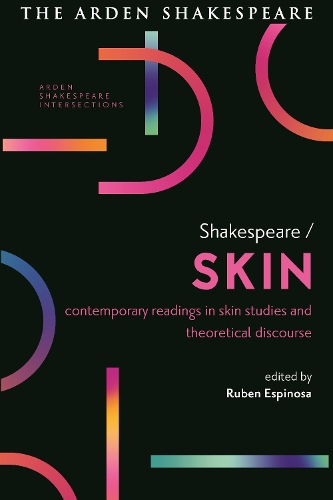
Shakespeare / Skin: Contemporary Readings in Skin Studies and Theoretical Discourse
(Hardback)
Publishing Details
Shakespeare / Skin: Contemporary Readings in Skin Studies and Theoretical Discourse
By (Author) Ruben Espinosa
Series edited by Dr. Farah Karim Cooper
Series edited by Professor Gordon McMullan
Series edited by Lucy Munro
Series edited by Professor Sonia Massai
Bloomsbury Publishing PLC
The Arden Shakespeare
8th August 2024
United Kingdom
Classifications
Tertiary Education
Non Fiction
Literary reference works
Theatre studies
822.33
Physical Properties
Hardback
352
Width 158mm, Height 240mm, Spine 30mm
682g
Description
Shakespeare / Skin offers a comprehensive array of readings of 'skin' in Shakespeare's works, a term that embraces the human and animal, noun and verb. Deliberate in its reimagining of critical and theoretical categories such as queer theory, animal studies and indigenous studies, to name a few, Shakespeare / Skin intervenes in various areas of the field to offer a wide range of methodological approaches grounded in antiracist practice. Each of the chapters interrogates and centres 'skin' in relation to a specific area of expertise: performance studies, eco-criticism, aesthetics, animal studies, religious studies, queer theory, indigenous studies, digital humanities, history, food studies, affect theory, border studies, trans studies, disability studies, Black feminism, disease studies, or pedagogy and together they offer a panoramic reading of skin in Shakespeare's work. With contributors from the USA, UK, South Africa, India, Singapore and Australia, readings are informed by a wide array of histories and shed light on how skin was understood in Shakespeare's time and at key moments during the past 400 years in different media and cultures. For researchers and instructors, Shakespeare / Skin offers an encyclopedic range of readings that will help to shape teaching and inform research through its modelling of antiracist critical practice.
Author Bio
Ruben Espinosa is Associate Professor of English at the University of Texas at El Paso, USA, where he specializes in Shakespeare and early modern studies. He is the author of Shakespeare on the Shades of Racism (2021) and Masculinity and Marian Efficacy in Shakespeares England (2011) and co-editor of Shakespeare and Immigration (2014).
